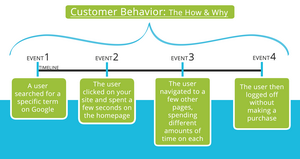SurveillanceBig tech surveillance could damage democracy
Data is often called the oil of the 21st century. The more tech companies know about their users, the more effectively they can direct them to goods and services that they are likely to buy. The more companies know about their users, the more competitive they are in the market. But this business model – what I consider spying machines – has enormous potential to violate civil liberties. Big tech is already being used abroad to enhance the power of repressive regimes, as my work and others’ has shown.

One method of gathering customer data // Source: wikipedia.org
Data is often called the oil of the 21st century.
The more tech companies know about their users, the more effectively they can direct them to goods and services that they are likely to buy. The more companies know about their users, the more competitive they are in the market.
Custom-tailored capitalism is what has made Google, Facebook, Amazon and others the richest companies in the world. This profit incentive has turned big tech into a competitive field of mass intelligence gathering. The better and more comprehensive the data, the higher profits will be.
But this business model – what I consider spying machines – has enormous potential to violate civil liberties. Big tech is already being used abroad to enhance the power of repressive regimes, as my work and others’ has shown.
While it is not presently a direct threat to U.S. democracy, I worry that the potential for future abuses exists so long as big tech remains largely unregulated.
Big tech’s spy machines
Current news is rife with examples of data abuses. In April, NBC News broke a story detailing how Facebook CEO Mark Zuckerberg had used data gathered by the platform to support his friends and defeat his rivals.
This is not Facebook’s first privacy PR nightmare. In 2018, data firm Cambridge Analytica used a Facebook app to collect data profiles of over 87 million people, which was later used to distribute targeted political advertising during elections.
Facebook is not alone in the data collection boom. This May, it was revealed that Snapchat employees were using the app’s data to obtain location data, pictures and email addresses without users’ consent. A new book by former Harvard business professor Shoshana Zuboff goes into great detail of the practices of what she calls “surveillance capitalism.” Zuboff writes, “Once we searched Google. Now, Google searches us.”
The practice goes beyond someone’s taste in music or what they purchase on Amazon. Apps created to help people through mental illness or quit smoking sell data to big tech companies. These users could be potential targets for social stigmatization or targeted advertising that exacerbates heath problems rather than solving them.
In December, The New York Times published an exposé on what one can learn about someone using their collated data from apps and smartphones. By blending location tracking with other online behavior, researchers were able to put together a detailed portrait of the most
